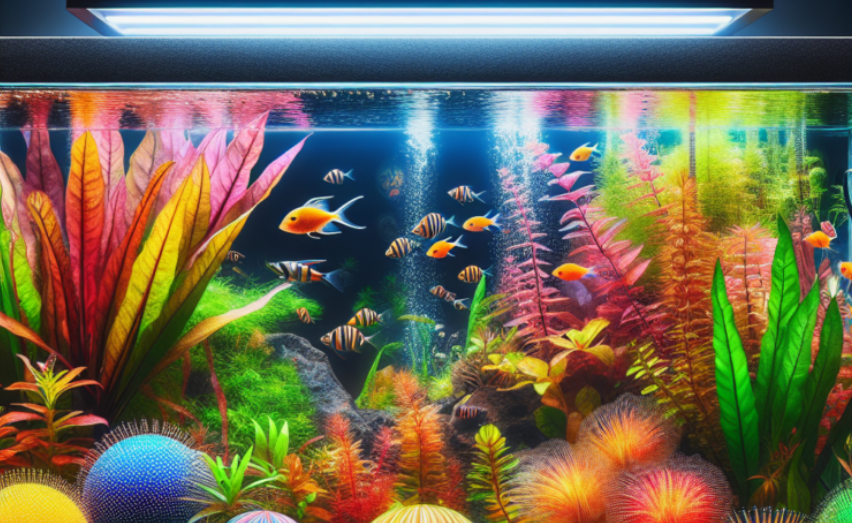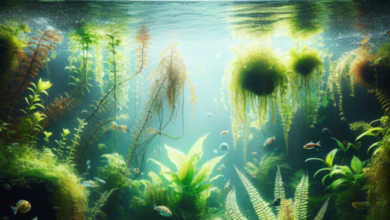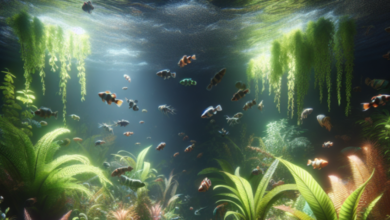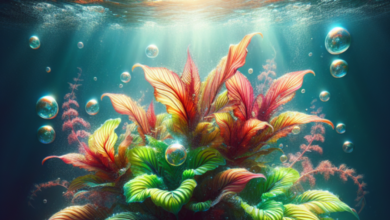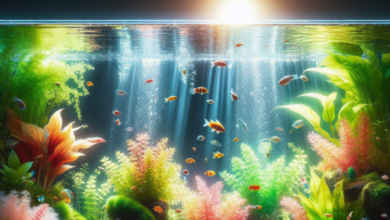Aquariums are not only a beautiful addition to any space but also an ecosystem of their own. Adding vibrant plant bulbs to your aquarium can transform it into a captivating underwater garden, providing numerous benefits for your aquatic life. In this comprehensive guide, we will explore the world of aquarium plant bulbs, helping you choose the right ones and providing valuable insights on their care and maintenance.
I. Understanding the Importance of Aquarium Plant Bulbs
Aquarium plant bulbs play a crucial role in creating a visually appealing and healthy environment for your aquatic organisms. They offer a range of benefits, including:
1. Oxygenation and Filtration
Just like land plants, aquarium plant bulbs undergo photosynthesis, producing oxygen and absorbing carbon dioxide. This natural process helps oxygenate the water, promoting the overall well-being of your fish and other inhabitants. Additionally, the roots of these plants provide biological filtration by absorbing excess nutrients and reducing harmful substances in the water.
2. Natural Habitat Replication
Aquarium plant bulbs help recreate a natural habitat for your aquatic organisms. They provide shelter, hiding spots, and breeding grounds for different species, making them feel secure and reducing stress levels. The presence of plants also mimics the natural ecosystem, promoting the overall balance and harmony within the aquarium.
3. Aesthetics and Visual Appeal
With their vibrant colors, unique shapes, and graceful movements, aquarium plant bulbs add a touch of beauty and elegance to your underwater world. They create a visually appealing environment, making your aquarium a captivating centerpiece in any room. Additionally, these plants can be arranged creatively to create stunning landscapes and depth within the tank.
II. Choosing the Right Aquarium Plant Bulbs
Choosing the right aquarium plant bulbs is essential to ensure their successful growth and compatibility with your aquatic environment. Consider the following factors when making your selection:
1. Light Requirements
Different plant species have varying light requirements. Some plants thrive in low-light conditions, while others require high-intensity lighting. Assess the lighting setup in your aquarium and choose plant bulbs accordingly. LED lights are popular choices for aquariums due to their energy efficiency and ability to provide customizable light spectrums.
2. Growth Rate and Size
Consider the growth rate and size of the plants when selecting aquarium plant bulbs. Some species grow rapidly and may require frequent trimming, while others grow slowly and remain compact. Plan accordingly based on the available space in your tank and the desired aesthetic.
3. Compatibility with Water Conditions
Ensure that the plant bulbs you choose are compatible with the water conditions in your aquarium. Some plants prefer soft water, while others thrive in harder or brackish water. Additionally, consider the pH level and temperature requirements of the plants to ensure their long-term health.
4. Nutrient Requirements
Aquarium plant bulbs have varying nutrient requirements. Some plants are heavy feeders and may require additional fertilization, while others can thrive solely on the nutrients present in the aquarium water. Understanding the nutrient needs of the plant bulbs you choose will help you maintain their health and vitality.
III. Caring for Aquarium Plant Bulbs
To ensure the well-being and longevity of your aquarium plant bulbs, it is important to provide proper care and maintenance. Follow these guidelines to create an optimal environment for their growth:
1. Planting Techniques
When planting aquarium plant bulbs, carefully follow the instructions provided with each specific species. Generally, it is recommended to bury the bulbs partially in the substrate, ensuring that the roots are securely anchored. Avoid burying the bulbs too deep, as this may hinder their growth.
2. Lighting and Photoperiod
Proper lighting is crucial for the growth of aquarium plant bulbs. Ensure that the bulbs receive the appropriate amount of light based on their specific requirements. Additionally, establish a consistent photoperiod (lighting duration) to mimic natural day-night cycles. Most aquatic plants thrive with 8-10 hours of light per day.
3. Water Quality and Maintenance
Maintaining optimal water quality is vital for the health of your aquarium plant bulbs. Regularly test the water parameters such as pH, temperature, ammonia, nitrite, and nitrate levels. Perform water changes as needed to maintain stable and healthy conditions. Additionally, remove any decaying or dead plant matter promptly to prevent water contamination.
4. Nutrient Supplementation
Depending on the nutrient requirements of your chosen plant bulbs, consider supplementing their diet with fertilizers. Liquid fertilizers or root tabs can provide essential nutrients such as nitrogen, phosphorus, and potassium. Be cautious not to over-fertilize, as this can lead to algae overgrowth and harm the plants and aquatic life.
IV. Frequently Asked Questions (FAQ)
1. *Can I use regular light bulbs for my aquarium plants?*
Regular light bulbs may not provide the specific light spectrum required for optimal plant growth. It is recommended to invest in LED lights designed for aquariums, as they offer customizable light spectrums and energy efficiency.
2. *How often should I trim my aquarium plant bulbs?*
The frequency of trimming depends on the growth rate of the plant species you have. As a general guideline, trim the plants when they start to obstruct the desired aesthetic or overshadow other plants in the tank.
3. *What are some common signs of nutrient deficiency in aquarium plant bulbs?*
Nutrient deficiencies can manifest in various ways, including yellowing or browning of leaves, stunted growth, and poor overall plant health. Regularly monitor the appearance of your plants and adjust nutrient supplementation accordingly.
4. *Can I use CO2 supplementation for my aquarium plant bulbs?*
CO2 supplementation can greatly benefit the growth of aquarium plant bulbs, especially in tanks with high light intensity. However, it requires careful monitoring and knowledge to prevent CO2 overdosing, which can harm fish and other organisms in the tank.
5. *Are all aquarium plant bulbs safe for all fish species?*
While most aquarium plant bulbs are safe for fish, some species may be nibbled or uprooted by certain fish species. Research the compatibility of the plant bulbs with your fish to ensure a harmonious coexistence.
In conclusion, enhancing your aquarium with vibrant plant bulbs not only adds beauty but also creates a healthier and more natural environment for your aquatic life. By understanding the importance of these bulbs, making informed choices, and providing proper care, you can create an underwater paradise that captivates both you and your aquatic companions.
